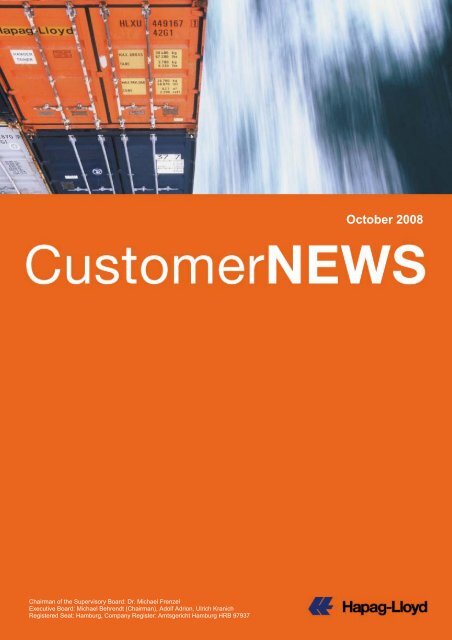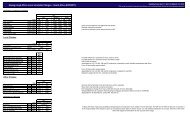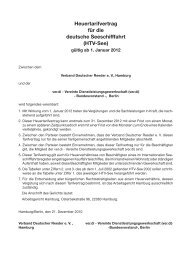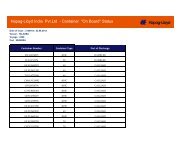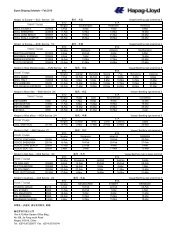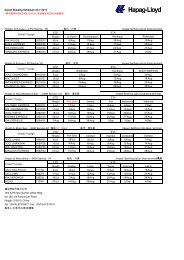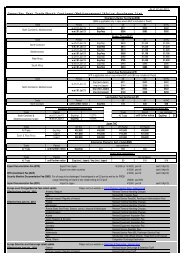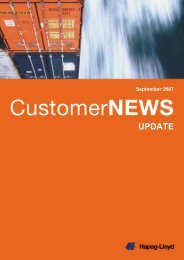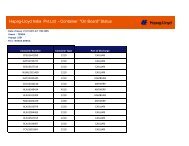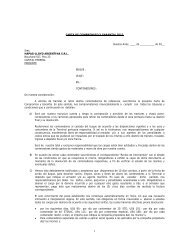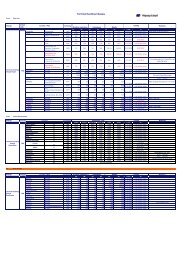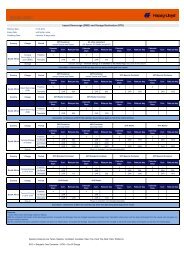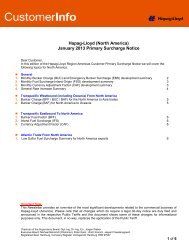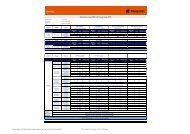Open print version - Hapag-Lloyd
Open print version - Hapag-Lloyd
Open print version - Hapag-Lloyd
Create successful ePaper yourself
Turn your PDF publications into a flip-book with our unique Google optimized e-Paper software.
October 2008<br />
June 2006<br />
Update on CP Ships Integration<br />
Chairman of the Supervisory Board: Dr. Michael Frenzel<br />
Executive Board: Michael Behrendt (Chairman), Adolf Adrion, Ulrich Kranich<br />
Registered Seat: Hamburg, Company Register: Amtsgericht Hamburg HRB 97937<br />
1
October 2008<br />
Dear <strong>Hapag</strong>-<strong>Lloyd</strong> Customer,<br />
We are pleased to present the October edition of our Customer<br />
News, informing you about the latest developments within <strong>Hapag</strong>-<br />
<strong>Lloyd</strong>.<br />
This Customer News covers the following topics:<br />
• New & Enhanced Services<br />
• Security Changes<br />
• Trade Information<br />
• New e-Business Feature: Advanced PDF Shipping<br />
Instructions<br />
• Environmental Management: Setting a green Course<br />
• New <strong>Hapag</strong>-<strong>Lloyd</strong> Area Denmark<br />
In case you require any further information or have any questions,<br />
please contact your local <strong>Hapag</strong>-<strong>Lloyd</strong> office or visit our website<br />
www.hapag-lloyd.com.<br />
Kind regards,<br />
<strong>Hapag</strong>-<strong>Lloyd</strong><br />
2
October March 2008<br />
• New & Enhanced Services<br />
• Europe - Australia: New direct Service<br />
<strong>Hapag</strong>-<strong>Lloyd</strong> will start along with a partner shipping<br />
line a direct service with weekly departures from<br />
Europe to Australia at the end of November 2008.<br />
12 modern vessels with adequate reefer capacity<br />
will be deployed in this service offering short transit<br />
times to ensure an enhanced coverage of the<br />
Australian market. Subject to regulatory approvals,<br />
this will be the only direct service from Europe to<br />
Australia via Suez. It will replace the previous ANS<br />
service. Northbound the service will continue to call<br />
at Singapore and Colombo. Ports in Malaysia, India<br />
and Sri Lanka will be added to the rotation.<br />
The vessels to be deployed in this service will be<br />
capable of carrying 2,800 standard containers each<br />
on this route with a round voyage time of 84 days.<br />
The port rotation will be Tilbury, Hamburg,<br />
Rotterdam, Le Havre, La Spezia, Damietta,<br />
Fremantle, Melbourne, Sydney, Brisbane,<br />
Melbourne, Adelaide, Singapore, Port Kelang,<br />
Chennai, Colombo, Damietta, Malta, La Spezia and<br />
back to Tilbury. New Zealand is to be called at with<br />
an independent service in future improving our<br />
presence in this market.<br />
The Australia/New Zealand transport market is<br />
continuously expanding. Container volume between<br />
Europe and ‘Down Under’ came to approx. 550,000<br />
standard containers (TEU) last year. According to<br />
Global Insight, this total will exceed 600,000 TEU by<br />
2009 with annual growth rates of 4-5%. Southbound<br />
cargo is chiefly paper, cardboard, cellulose,<br />
chemicals and machinery, while mainly food<br />
(particularly meat) and beverages (wine) are<br />
shipped to Europe.<br />
The WSX service, which begins upgrading to<br />
weekly from October, links Asia to South Africa,<br />
Ghana, Togo and Nigeria on the following<br />
rotation: Shanghai, Ningbo, Xiamen, Shekou, Port<br />
Kelang, Durban, Tema, Lome, Lagos (Tin-Can),<br />
Durban, Port Kelang and Shanghai.<br />
After upgrade the service will deploy 10 vessels<br />
with capacities ranging between 2,000 – 2,500<br />
TEU and adequate reefer plugs. <strong>Hapag</strong>-<strong>Lloyd</strong> will<br />
eventually deploy two vessels in the service,<br />
which is jointly operated with partners China<br />
Shipping and Maruba Lines.<br />
• Asia - Mediterranean:<br />
Enhanced Mediterranean Service<br />
<strong>Hapag</strong>-<strong>Lloyd</strong> and its Grand Alliance partners have<br />
enhanced its service between Mediterranean and<br />
Asia (EUM) to proactively cater for our customers<br />
needs. Valencia has been added as a port of call<br />
in the current EUM service mid of August 2008.<br />
Port rotation for the enhanced Mediterranean<br />
service is: Busan, Shanghai, Ningbo, Shekou,<br />
Hong Kong, Singapore, Port Kelang, Jeddah,<br />
Damietta, Genoa, Fos, Barcelona, Valencia,<br />
Damietta, Singapore, Hong Kong, Busan. Eight<br />
vessels with the capacity of approximately 6,000<br />
TEU are deployed in the service.<br />
Port Rotation of EUM<br />
• Asia - Africa:<br />
New Asia - South/West - Africa Express<br />
‘upgrades to weekly’<br />
As announced in the last edition of the Customer<br />
News, <strong>Hapag</strong>-<strong>Lloyd</strong> launched a new service called<br />
WSX in July 2008 to serve the growing market<br />
between Asia, South and West Africa. The new<br />
WSX service has been designed to specifically meet<br />
<strong>Hapag</strong>-<strong>Lloyd</strong>’s existing and future customer<br />
requirements for a direct and reliable fixed day<br />
service between the two continents.<br />
• North America - Australia/New Zealand:<br />
Restructured Services<br />
Since end of August 2008 <strong>Hapag</strong>-<strong>Lloyd</strong> offers<br />
enhanced services from North America to<br />
Australia/New Zealand. This service restructure<br />
provides customers with three services off the US<br />
West Coast to Australia / New Zealand:<br />
3
October 2008<br />
– a weekly Pacific Southwest String (WAS 1)<br />
calling Long Beach, Auckland, Melbourne,<br />
Sydney, Tauranga, Suva (3x per month),<br />
Honolulu (1x per month), Oakland, Long Beach<br />
– a second fortnightly Pacific Southwest String<br />
(WAS 2) offering Long Beach, Tauranga, Sydney,<br />
Melbourne, Brisbane, Long Beach<br />
– a fortnightly Pacific Northwest String (WAN)<br />
sailing from Seattle, Vancouver, Long Beach to<br />
Tauranga, Sydney, Melbourne, Adelaide and<br />
return via Auckland, Papeete, Ensenada to<br />
Oakland and Seattle<br />
Combined these three services offer a direct call into<br />
Adelaide (WAN) and Brisbane (WAS 2) every<br />
fortnight as well as continued coverage of the Pacific<br />
North West via the fortnightly WAN Service.<br />
• Mediterranean:<br />
Mediterranean hub changed to Cagliari, Italy<br />
With the objective of further improving our products,<br />
<strong>Hapag</strong>-<strong>Lloyd</strong> has restructured its transhipment<br />
activities in the Mediterranean by moving the<br />
transhipment hub from Gioia Tauro to the modern<br />
Cagliari International Container Terminal (CICT) as<br />
of mid September.<br />
CICT belongs to Eurogate / Contship Italia Group<br />
and went into service only in 2003. With a quay<br />
length of around 1.5 Kilometres, the terminal is<br />
equipped with 7 gantry cranes and one mobile<br />
crane, ensuring a high level of productivity with an<br />
annual handling capacity of 1.5 Million TEU.<br />
This step has been taken by <strong>Hapag</strong>-<strong>Lloyd</strong> together<br />
with the Grand Alliance members as well as other<br />
shipping lines that cooperate with <strong>Hapag</strong>-<strong>Lloyd</strong>.<br />
Involved services are: EU2 (Europe - Middle East /<br />
Red Sea part), AEX (Asia – Mediterranean - North<br />
America East Coast Express), Indian Ocean Service<br />
(IOS), Med Pacific Service (MPS), Joint<br />
Mediterranean Canada Service Route A (MCA) and<br />
Mediterranean Gulf Express (MGX).<br />
A comprehensive and efficient feeder network has<br />
been established to connect main Mediterranean<br />
locations with <strong>Hapag</strong>-<strong>Lloyd</strong> mainliners in Cagliari: 11<br />
new feeder loops with 17 vessels will provide<br />
extensive coverage of main areas, namely:<br />
East Med (Turkey, Lebanon, Israel , Egypt),<br />
Greek ports, Adriatic ports (North Italy, Croatia,<br />
Slovenia, Albania), Tyrrhenian ports in North and<br />
South Italy including Sicily, Malta, Tunisia and<br />
finally a dedicated loop to the Black Sea.<br />
The new feeder network and our mainliners will<br />
both operate in a congestion-free and a more<br />
efficient structure therefore ensuring best possible<br />
transit times and optimized productivity on<br />
transshipment operations for the benefit of our<br />
customers.<br />
• Service Changes<br />
Since the last edition of the Customer News<br />
<strong>Hapag</strong>-<strong>Lloyd</strong> has implemented further service<br />
changes in order to streamline the scope of our<br />
network. All service changes are highlighted in the<br />
annex 1.<br />
• Security Changes<br />
• New Customs Regulation in China<br />
Since the last edition of our Customer News there<br />
have been various meetings between carriers and<br />
Chinese customs in order to exchange views. In<br />
August data elements (manifest fields list) were<br />
published by customs. However, the XML (EDI)<br />
format and operational guidelines have yet to be<br />
published. The XML format is expected to be<br />
published in October and the operational<br />
guidelines by end of November. Customs expect<br />
to complete their own system development by<br />
November when both internal and external testing<br />
will be conducted.<br />
Customs will allow three months grace period<br />
from January 1 till March 31, 2009 when carriers<br />
will not be penalized for errors or failure to<br />
comply. However, there is no official<br />
announcement to this effect. <strong>Hapag</strong>-<strong>Lloyd</strong> will<br />
continue to monitor the development and keep<br />
you posted in due course.<br />
• AEO Certificate for <strong>Hapag</strong>-<strong>Lloyd</strong><br />
<strong>Hapag</strong>-<strong>Lloyd</strong> AG was the first German liner<br />
shipping company to be awarded the AEO<br />
Certificate end of July 2008 introduced by the EU<br />
at the beginning of this year.<br />
4
October 2008<br />
Thanks to this status, which stands for special<br />
reliability and trustworthiness, <strong>Hapag</strong>-<strong>Lloyd</strong> will in<br />
future enjoy more rapid customs clearance in the<br />
ports in Germany. In addition, the process of AEO<br />
certification is intended to ensure increased security<br />
in the transport chain.<br />
The AEO (Authorised Economic Operator)<br />
Certificate has been available for companies based<br />
in the EU and with Customs-relevant business since<br />
the beginning of 2008. The EU is also negotiating for<br />
recognition of AEO status with third countries such<br />
as the USA, China and Switzerland.<br />
• US Mandatory Automated Export System<br />
(AES)<br />
The US Department of Commerce and Census have<br />
issued a final rule in the Code of Federal<br />
Regulations, requiring the mandatory use of AES<br />
export reporting for US shipped cargo. Details of<br />
internal transaction numbers (ITNs) or exceptions<br />
may be viewed at http:// www.census.gov/foreigntrade/aes/.The<br />
new rules not only revise mandatory<br />
electronic reporting requirements for principal<br />
parties of interest (PPI’s), but for the carriers as well.<br />
This includes strict timing requirements prior to<br />
carrier arrival and loading. The regulation will be<br />
enforced by Customs and Border Protection (CBP)<br />
at US ports of exit. This regulation now has penalty<br />
provisions which have increased to $10,000 per<br />
incident, both for the shipper and carrier.<br />
The regulation which became effective July 2, 2008<br />
and was enforced after September 30, 2008 has<br />
resulted in both systems and process changes for<br />
<strong>Hapag</strong>-<strong>Lloyd</strong>. Our changes are intended to ensure<br />
that your cargo is loaded to an intended vessel<br />
when properly identified and to prevent the incurring<br />
of such penalties and added handling costs.<br />
This will rely largely on your ability to provide timely<br />
documentation prior to the carriers loading<br />
operation. Our customer service personnel will<br />
remind you of the requirements at time of booking<br />
and via our booking confirmations which will notate<br />
the documentation cutoffs. <strong>Hapag</strong>-<strong>Lloyd</strong> will require<br />
the documented evidence to reference the specific<br />
AES ITN number obtained, or the specific exemption<br />
citation that you might be allowed, by noon, 2<br />
business days prior vessel’s arrival. Without the<br />
timely provision of this information, your cargo will<br />
not be able to connect to the anticipated exporting<br />
vessel, and will be subject to all associated costs.<br />
• New Terminal Security Fee<br />
Catania, Italy: A terminal security fee of 8.00<br />
EUR per container, applicable to all import and<br />
export units, but excluding transshipments, was<br />
implemented effective August 18, 2008.<br />
• Trade Information<br />
• <strong>Hapag</strong>-<strong>Lloyd</strong> customized Tariff Items<br />
The Liner Shipping conferences serving Europe<br />
will be deregulated as per October 17, 2008.<br />
Correspondingly, <strong>Hapag</strong>-<strong>Lloyd</strong> is reviewing all of<br />
the freight components.<br />
The separate <strong>Hapag</strong>-<strong>Lloyd</strong> customized tariff<br />
items will be introduced step by step. This<br />
process has been started with the<br />
implementation of the <strong>Hapag</strong>-<strong>Lloyd</strong> Bunker<br />
Charge (BUC) as announced in the June edition<br />
of the Customer News and will be continued<br />
with the alignment of Terminal Handling<br />
Charges in Europe and the introduction a global<br />
Currency Adjustment Factor (CAF) formula.<br />
– Terminal Handling Charge (THC) in Europe<br />
<strong>Hapag</strong>-<strong>Lloyd</strong> has implemented new Terminal<br />
Handling Charges for North Europe as well as<br />
parts of the Western Mediterranean as of October<br />
1, 2008.<br />
In the past we had various THC’s in each<br />
European port and for each trade, as agreed in<br />
the individual conferences. <strong>Hapag</strong>-<strong>Lloyd</strong> has<br />
decided to harmonize these different charges and<br />
to simplify procedures leading to one THC for<br />
every country in North Europe and parts of the<br />
Western Mediterranean.<br />
Over the past years the container terminal<br />
capacity in North Europe has tightened and the<br />
terminal costs have increased considerably.<br />
Furthermore the energy costs for power provision<br />
have increased on the terminals in addition to<br />
reduced times and the costs for monitoring of<br />
reefer containers by the terminal operators have<br />
augmented. As a result, <strong>Hapag</strong>-<strong>Lloyd</strong> has<br />
adjusted the THC levels to reflect the<br />
developments in the terminal contracts and will<br />
implement a separate THC for reefers.<br />
5
October 2008<br />
– <strong>Hapag</strong>-<strong>Lloyd</strong> Currency Adjustment Factor<br />
The <strong>Hapag</strong>-<strong>Lloyd</strong> Currency Adjustment Factor<br />
(CAF) concept has been introduced effective from<br />
October 1, 2008 on all applicable trades.<br />
Our CAF formula is based on a weighting of costs<br />
and currencies over a monthly period to ascertain<br />
the appropriate amount. The costs and currencies<br />
are calculated per trade and are dependent on<br />
currency exposure and costs in applicable<br />
currencies for each particular trade.<br />
Rates of exchange will be monitored on a weekly<br />
basis and resulting CAF amount will be announced<br />
at the end of each month with 30 days notice.<br />
Your local <strong>Hapag</strong>-<strong>Lloyd</strong> office will inform you about<br />
the new THC levels as well as the CAF amounts<br />
which are relevant for you.<br />
• War Risk Surcharge inbound to Poti, Georgia<br />
The port of Poti, Georgia has reopened and full<br />
import & export service to Poti has been resumed.<br />
However, due to the political situation in Georgia,<br />
<strong>Hapag</strong>-<strong>Lloyd</strong> was forced to introduce a War Risk<br />
Surcharge of 175 USD per TEU as of beginning<br />
September 2008.<br />
• Middle East Congestion<br />
Due to ongoing congestion problems in Middle East<br />
and the resulting higher operational costs <strong>Hapag</strong>-<br />
<strong>Lloyd</strong> will implement a congestion surcharge of 100<br />
USD per TEU to all Middle East cargo effective<br />
October 2, 2008.<br />
The severe congestion in Middle East has a large<br />
impact on transhipment cargo via Jeddah e.g.<br />
Hodeidah. As a consequence, we currently cannot<br />
accept any cargo to Yemen until further notice.<br />
• New e-Business Feature:<br />
Advanced PDF Shipping<br />
Instructions<br />
<strong>Hapag</strong>-<strong>Lloyd</strong> is proud to offer their customers an<br />
advanced service to submit their Shipping<br />
Instructions electronically with simple and easy to<br />
use ‘intelligent’ PDF documents.<br />
The PDF documents are pre-filled with booking<br />
data sent via e-mail and can be edited with Adobe<br />
Reader. This new feature is particularly suitable<br />
for customers who currently do not exchange<br />
Shipping Instructions electronically with <strong>Hapag</strong>-<br />
<strong>Lloyd</strong>. Interested customers will receive a PDF<br />
document for each shipment, so that they may<br />
electronically exchange Bill of Lading Instructions<br />
with our company.<br />
The benefits for the customer: The PDF document<br />
already contains pre-filled booking data (e. g.<br />
ports of loading and discharge, acceptance and<br />
delivery places, vessel, …).<br />
Additional information can be easily added to the<br />
advanced PDF with the free Adobe Reader<br />
software (at least <strong>version</strong> 7.0.9). Another<br />
advantage is the use of templates: Recurring data<br />
for the same regular business do not have to be<br />
keyed in every time. Instead, it can be imported<br />
automatically into the document by a simple<br />
mouse click. Pre-filled fields (e. g. the fields<br />
containing the actual booking data) will be<br />
preserved and not overwritten with the template<br />
data. This saves a lot of time and avoids copy<br />
errors as well. Also, specific typing mistakes (e. g.<br />
syntax of the container number) are automatically<br />
recognized and corrected.<br />
Furthermore, the proactive e-mail solution serves<br />
the customer’s export team as a gentle reminder<br />
to send B/L Instructions to <strong>Hapag</strong>-<strong>Lloyd</strong>.<br />
The PDF layout is structured according to the final<br />
B/L allowing for easy data insertion. As soon as<br />
the PDF Shipping Instruction has been finalized, it<br />
can be sent to <strong>Hapag</strong>-<strong>Lloyd</strong>: The “Send” button<br />
within the document opens up an e-mail message<br />
in the customer’s e-mail system (e. g. MS<br />
Outlook) automatically. This e-mail to which the<br />
Shipping Instruction is attached is pre-addressed<br />
to a special <strong>Hapag</strong>-<strong>Lloyd</strong> mailbox. Within <strong>Hapag</strong>-<br />
<strong>Lloyd</strong> the mail will be processed automatically as<br />
an EDI message. This improves data quality and<br />
the B/L cycle time.<br />
The pre-filled data in combination with the easy to<br />
use template function enables our customers to<br />
complete Shipping Instructions within minutes. An<br />
e-mail account and the free Adobe Reader<br />
software is all that the customer needs to start.<br />
6
October 2008<br />
For further information please contact your local<br />
<strong>Hapag</strong>-<strong>Lloyd</strong> Sales or Customer Service<br />
representative. A handling guideline is available on<br />
www.hapag-lloyd.com – directly after the log-in to<br />
the <strong>Hapag</strong>-<strong>Lloyd</strong> online business section.<br />
• Environmental Management:<br />
Setting a green Course<br />
Shipping is by far the most<br />
environmentally friendly way of moving<br />
goods. Nevertheless, the industry is working on<br />
finding other ways to further increase its lead over<br />
other modes of transport and reduce emissions<br />
even more.<br />
The new IMO emissions resolution to be approved<br />
this autumn is proof of this (see June edition of the<br />
Customer News). Customers are also increasingly<br />
considering logistics provider’s involvement in<br />
environmental protection when making their choice.<br />
The number of customer questions related to this<br />
topic doubled at <strong>Hapag</strong>-<strong>Lloyd</strong> from 2006 to 2007<br />
from 20 to over 40.<br />
In environmental protection <strong>Hapag</strong>-<strong>Lloyd</strong> is<br />
traditionally one of the forerunners. The new fuelsaving<br />
thrust-fin is being used for the first time on<br />
the <strong>Hapag</strong>-<strong>Lloyd</strong> newbuilding ‘Kuala Lumpur<br />
Express’ which was named end of April 2008. The<br />
fin developed by shipbuilders Hyundai Heavy<br />
Industries, is several metres wide and sits behind<br />
the propeller on the rudder horn, reducing<br />
hydrodynamic loss caused by propulsion of the ship.<br />
<strong>Hapag</strong>-<strong>Lloyd</strong> also took a leading role in the industry<br />
by allowing containerships to sail more slowly,<br />
reducing fuel consumption and emissions.<br />
Consumption is down by around 50 per cent, when<br />
the ship sails at 20 knots instead of 25. Reducing<br />
from 23.5 to 20 knots would reduce heavy oil<br />
consumption by 35 per cent. Emissions of CO2,<br />
sulphur, and nitrogen oxides are reduced at the<br />
same rates.<br />
In the past ships’ engines have become more and<br />
more efficient. Thanks to technical advances the<br />
specific consumption of main engines has been<br />
reduced around 30 per cent since the end of the<br />
60s with the same performance. In the ‘Colombo<br />
Express’ class for example the engines are<br />
electronically controlled ensuring optimized and<br />
more economic operation.<br />
Our commitment to the environment is mirrored<br />
here again by an award. In 2007 <strong>Hapag</strong>-<strong>Lloyd</strong><br />
became the first shipping line in the world to be<br />
awarded the Germanischer <strong>Lloyd</strong> ‘GL Excellence<br />
– 5 Stars’, demonstrating our fulfilment of high<br />
standards for the environment, safety at work,<br />
security and quality.<br />
• New <strong>Hapag</strong>-<strong>Lloyd</strong> Area Denmark<br />
With effect from October 1, 2008, <strong>Hapag</strong>-<strong>Lloyd</strong><br />
has by mutual agreement taken over the container<br />
shipping activities of Fellowship I/S in Denmark.<br />
The employees hitherto active for <strong>Hapag</strong>-<strong>Lloyd</strong><br />
are also taken over by the shipping line. Area<br />
Denmark continues to be managed by Henrik<br />
Allerup, reporting directly to Region North Europe.<br />
The address in Holte in Denmark and phone nos.,<br />
etc. remains unchanged.<br />
“Fellowship was already active for <strong>Hapag</strong> and<br />
North German <strong>Lloyd</strong>, so it is one of our really<br />
traditional partners. Its management and<br />
employees have contributed a great deal to<br />
upholding <strong>Hapag</strong>-<strong>Lloyd</strong>’s excellent reputation in<br />
Denmark. We are thus very satisfied that there will<br />
now be a smooth transition and customers will<br />
retain their previous contact persons,” stated<br />
Ulrich Kranich, executive board member of<br />
<strong>Hapag</strong>-<strong>Lloyd</strong> AG.<br />
During dry-docking the underwater areas of <strong>Hapag</strong>-<br />
<strong>Lloyd</strong> ships are given a biocide-free silicone coating.<br />
Not only is it clearly more economical to apply than<br />
standard underwater coatings, but it also reduces<br />
ships’ resistance in the water, which in turn reduces<br />
fuel consumption up to 6 per cent.<br />
7
October 2008<br />
Annex 1: Service Changes<br />
North Atlantic Trade<br />
Mediterranean Gulf Express / MGX<br />
• The port call at Gioia Tauro was<br />
replaced by Cagliari beginning of<br />
September 2008.<br />
JMCS Route A / MCA<br />
• The port call at Gioia Tauro was<br />
replaced by Cagliari beginning of<br />
September 2008.<br />
Asia-Mediterranean-North America East Coast / AEX<br />
• The port call at Gioia Tauro was<br />
replaced by Cagliari beginning of<br />
September 2008.<br />
Med Pacific Service/ MPS<br />
• The port call at Gioia Tauro was<br />
replaced by Cagliari mid of<br />
September 2008.<br />
Zephyr Container Express / ZCX<br />
• A port call at Genoa was added end<br />
of August 2008.<br />
8
October 2008<br />
Europe - Asia Trade<br />
Indian Ocean Service / IOS<br />
• The port call at Gioia Tauro was<br />
replaced by Cagliari mid of<br />
September 2008.<br />
Europe - Asia Loop 2 / EU 2<br />
• The port call at Gioia Tauro was<br />
replaced by Cagliari end of<br />
August 2008.<br />
Intra Asia Trade<br />
West Japan-Korea-Thailand-<br />
Philippines Service / CBW<br />
Japan-Central-China-Thailand-<br />
Vietnam Service / CBC<br />
• Two new Japan - Thailand<br />
services (CBW / CBC)<br />
have replaced the Japan<br />
Thailand Vietnam Service<br />
(JTV) mid of September 2008<br />
to further enhance the Intra<br />
Asia product portfolio.<br />
Singapore Qingdao Service / RSQ<br />
• The port call at Shanghai was<br />
dropped beginning of<br />
September 2008.<br />
9
October 2008<br />
China Red Sea Service / CRS<br />
• The eastbound port call at<br />
Jeddah was dropped mid of<br />
September 2008.<br />
Inter North & Latin America Trade<br />
Brazil Express Loop 1 / BX1<br />
Brazil Express Loop 2 / BX2<br />
• Two new Brazil Express services<br />
(1 & 2) have replaced the Brazil<br />
Eastcoast Express (BEX)<br />
beginning of September 2008<br />
offering an extended service<br />
coverage between North and<br />
Latin America.<br />
Intra Latin America Trade<br />
Mexico Chile Service / MXP<br />
• Port calls at Mazatlan, Lazaro<br />
Cardenas, Puerto Caldera and<br />
Paita were dropped mid of<br />
September 2008.<br />
10
October 2008<br />
Australia / New Zealand Trade<br />
Oceania Service / OCE<br />
• The rotation of this service changed<br />
as to Napier being served before<br />
Tauranga on the eastbound leg end<br />
of August 2008.<br />
Australia / New Zealand via Panama / ANP<br />
• Port calls at Timaru and Napier were<br />
added end of August 2008.<br />
11


